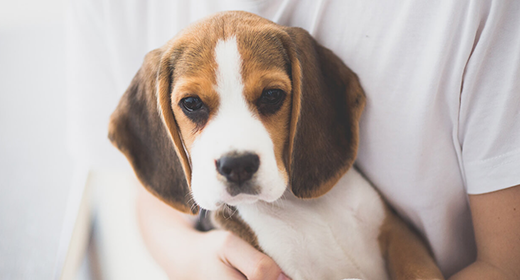

With so many choices, finding a good puppy food can seem outright daunting. Well, it’s about to get a little easier. Watch as Dr. Katy Nelson takes you through the ins and outs of puppy nutrition with information on everything from age appropriate dog food, to the importance of feeding schedules.
Hi, I'm Dr. Katy Nelson with IAMS. Today we're going to talk about dog nutrition, and what you should look for in your puppy's food. Just like infants, puppies require different levels of nutrients than older dogs. Physically, puppies grow fastest during the first six months. The right nutrition is critical to support this rapid growth. That said, your puppy should only receive premium puppy food until he reaches his adult height and weight. That's typically in the first year for small and medium breeds, and can be up to two years for large and giant breeds. One more thing to consider is that a puppy's energy requirements can be nearly twice that of an adult dog. And since their stomachs are smaller, they need more nutritionally dense food formulated just for puppies to help them meet their energy needs. There are three types of food: dry kibble, semi-moist—which comes in sealed packages—and moist or canned. Most veterinarians and trainers recommend dry kibble food, because of its fat content, and the fact that moist food can spoil. Dry kibble also helps with tartar control, which is particularly important for his developing teeth. When you're shopping for food, there are a couple of things you want to look for and keep in mind. Number one, look on the label for a statement that says, 'Formulated to meet the nutritional levels established by the AAFCO dog food Nutrient Profiles for growth.' Number two, read the ingredients list on the back of the package, and look for real meat as the first ingredient. Puppies grow the fastest during the first six months of life, and because growth rates differ among breed sizes, you need to feed a formula designed to address the needs of your puppy's breed and size. Ideally, puppy food should also contain animal based protein for strong muscles. The protein requirement for growing poppies is higher than that for adult dogs. High quality protein is critical for puppies to create new body tissue as they grow. Calcium for strong bones and teeth, iron for healthy blood, DHA for the brain, central nervous system, and vision. DHA is a key ingredient found naturally in mother's milk, and is important for a baby's neural development. Just like a baby, your puppy's ability to learn depends on healthy brain development. Prebiotics for healthy immune system, because 65% of your puppy's immune system is in his digestive tract, and high in calories for all the energy a puppy burns. The nutritional needs for puppies differ for different breeds sizes. Large breed puppies grow more quickly. Because of that, they actually need less calcium, so their bones don't grow too fast. Medium breed dogs need a careful balance of calories and nutrients to be sure that they don't gain excess weight, while small breed puppies need nutrient dense food in small bites, because their metabolism tends to be faster, and they have different energy needs than larger dogs. Another important thing to know is that what is good for humans is not necessarily good for animals. Because proper nutrition is critical for optimal development, and because human food doesn't offer the proper balance of nutrients puppies need, it is important to teach your whole family that feeding your puppy or your dog table scraps is a big no-no, and a major health hazard. Now let's talk about feeding schedules. Just like babies, puppies do best on a regular schedule. Schedules teach them that there are times to eat, times to play, and times to potty. Obviously, the feeding schedule will largely be dictated by your own personal schedule. But no matter what, it is critical that puppies younger than four months be fed multiple times per day. Depending on your puppy's breed size, at around six months, you can start to limit feedings to twice a day. Also, keep in mind that eating is soon followed by the urge to go to the bathroom. If you work away from your house and are unable to feed and walk your puppy as often as needed, think about hiring a dog walker, or ask a neighbor to help you keep your puppy on his schedule. For more information on house training, watch 'How to House Train Your Puppy.' Another important nutritional determinant is how much you're supposed to feed your developing puppy. Even though the back of the puppy food bags usually have suggested portion sizes based on weight, they are not always right for your puppy. So it's best to pay attention to your puppy's body and talk to your veterinarian. Remember, a fat puppy is not necessarily a healthy puppy. Just as childhood obesity can lead to adult health issues in humans, monitoring a puppy's weight is very important to ensure proper development. Treats are another food source to consider when determining portion size. It is important to limit treating to less than 10% of your puppy's daily caloric intake. When selecting treats, hard chew treats are ideal, because they improve dental health through gnawing. Also, try to save treating for training sessions to reward good behavior, but be careful not to overdo it. For more information on training, watch our video 'Puppy training basics.' The last part of puppy nutrition we are going to talk about is water. Puppies need fresh, clean water available at all times. Like us, it is their most important nutrient. You should change your puppy's water often, at least once a day. Providing fresh, clean water greatly reduces the risk of disease, and therefore keeps your pet happy and healthy. I'm Dr. Katy Nelson for IAMS, and I hope that you found this helpful as you welcome your new addition into your family.


As a new puppy parent, you may feel overwhelmed by the sheer amount of information available on properly feeding your furry friend. But don't worry – we are here to help! In this blog post, we will share tips and tricks on puppy feeding, so your canine companion gets all the nourishment it needs to grow and thrive.
First and foremost, it's important to follow a consistent feeding schedule for puppies. This will help them get used to regular meals and prevent them from developing bad habits like begging for food. It's also essential to choose a high-quality puppy food formulated specifically for their age and size. Look for options containing real, wholesome ingredients and avoid anything packed with fillers or additives.
Overfeeding your puppy can lead to obesity and other health issues. It's also important to pay attention to portion sizes. And if you need help with how much to feed a puppy, feel free to ask your veterinarian for guidance.
Puppies have specific nutritional needs that change as they grow and develop. It is crucial to ensure they get the right amount of food at the right time. Our puppy feeding guide is designed to help you determine the appropriate serving size for your puppy based on age and weight. Following these guidelines ensures that your puppy gets the nutrition it needs to thrive and stay healthy.
[Puppy Feeding Chart]
Puppies are energetic and adorable little creatures, but they also require proper nutrition to grow and develop properly. So, how much should you feed a puppy?
Firstly, it's important to consider the size and breed of your puppy. Larger breeds will need more food, while smaller breeds will need less. It's also important to consider the puppy's age. Puppies under 12 weeks of age should be fed four times a day, while puppies over 12 weeks of age should be fed three times a day.
Regarding the amount of food, it's best to follow the guidelines on your puppy's food label. These guidelines are based on the puppy's weight and age and will ensure that your puppy is getting the right amount of nutrients. It's also essential to choose a high-quality puppy food developed specifically for puppies, as this will provide all the nutrients you puppy needs.
It's also important to remember that puppies have small stomachs and may need to eat smaller meals more frequently. If your puppy seems hungry between meals, you can offer them a small, healthy snack, such as a piece of cooked chicken or a small amount of carrot.
In summary, feeding your puppy the right amount of food at the correct time is important. Follow the guidelines on your puppy's food label and choose high-quality puppy food to ensure that your furry friend gets the nutrients required to grow into a healthy dog. Remember to consider your puppy's size and age, and offer small, healthy snacks as needed. Your puppy will grow into a healthy and happy dog with proper feeding.
The general rule of thumb is to switch your puppy to adult food when they reach around 80% of its expected adult size. This usually occurs when it is 12 to 18 months old, depending on the breed. Smaller breeds tend to reach adult size faster, while larger breeds may take longer.
To determine when your puppy is ready for the switch, it's important to pay attention to their body condition and weight. If your puppy is still growing rapidly and has a lot of energy, they are probably still being prepared for adult food. On the other hand, if they are starting to slowdown in growth and seem to be reaching their adult size, it's time to make the switch.
It's also a good idea to consult with your veterinarian for advice on when to switch your puppy to adult food. They can help you determine the best time based on your puppy's specific needs and growth rate.
In general, choosing high-quality adult food that is appropriate for your puppy's size and breed is imperative. Look for a formula rich in proteins, vitamins, and minerals to support their overall health and development. With careful planning and attention, you can ensure that your puppy grows into a healthy, happy adult dog.

